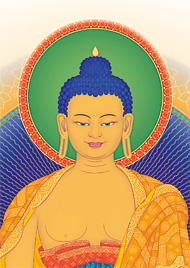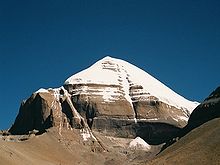Tibetan Buddhists celebrate their most important religious holiday this month. Saka Dawa is a full month of celebrations honouring the life of the Buddha. The festival is celebrated during the 4th month of the Tibetan Lunar Calendar, a significant month as it is the one in which the Buddha’s conception, birth, enlightenment and death all occurred. This year Saka Dawa runs from May 29 – June 27, with major celebrations taking place on the full moon, the 13th June.
The word “Dawa” means “month” in Tibetan and “Saka” is the name of the most prominent star tracked by Tibetan astrology at this time of year. Tibetan Buddhists observe Saka Dawa by paying special attention to their dharma practice, visiting holy sites to offer prayers and engaging in spiritual activities. Saka Dawa is also known as “the month of merits” as Tibetans believe that one merit achieved during Saka Dawa equals numerous merits achieved on other days, and that good actions performed on the 15th day of the month can be multiplied by as much as one hundred million times. Many Tibetans will quit drinking or gambling, give up meat for the month, or give alms to beggars. Other actions that can achieve merit include giving donations to nunneries or monasteries, making pilgrimages to holy places, circumambulating – making a circle around – stupas and holy sites, making prostrations, praying and reciting mantas, lighting butter lamps and setting animals free into the wild before they are killed.
The 15th day of the month is the holiest day of Saka Dawa, as it was this full moon day that the Buddha was conceived, achieved enlightenment and passed into Nirvana. On June 13 this year, hundreds of thousands of Tibetan Buddhists will take a day off work to visit holy sites to offer prayers and engage in spiritual activities and special pujas. They will promise to take the eight Buddhist precepts of Mahayana and many will visit Lhasa to walk around the city, see the Potala Palace, turn prayer wheels and picnic in the Dzongyab Lukchang Park.
Saka Dawa is now one of the most influential religious festivals of Tibetans in exile. However, during recent years, restrictions on religious freedoms during Saka Dawa have been reported together with an increase in surveillance with video cameras and plain-clothed personnel monitoring people’s activities.The Central Tibetan Administration (CTA) reports further restrictions on Tibetan Buddhists in Tibet as they celebrate Saka Dawa this year, saying government officials have been asked not to take their annual leave during this period, and any officials disregarding this have been threatened with dismissal. The CTA also reports that Chinese authorities have been trying to restrict the number of visitors to Mount Kailash, a mountain holy to Tibetan Buddhists and a popular holy site during this time.
The CTA also report similar restrictions on Tibetans in Tibet who wish to travel to India attend the Kalachakra Initiations to be led by His Holiness the Dalai Lama in July this year in Leh in north India. They write: “Chinese authorities have also stopped issuing new or renewing old passports to Tibetans […] those who have already obtained their passports in the past have been asked to submit it back to the authorities.” Consequences for people from Tibet who travel to attend the Kalachakra Intiations in India would be the withdrawal of their them-tho, a household registration system, the source reports. Kalachakra, which means “Wheel of Time,” is a ritual that prepares devotees to be reborn in Shambhala, a celestial kingdom which, it is said, will vanquish the forces of evil in a future cosmic battle.
Radio Free Asia reports that government employees in northwestern China’s Gansu province have been barred from participating in the Kalachakra ceremony this week which is being held at the Genden Choeling monastery in Tsoe (in Chinese, Hezuo) city in the Kanlho (Gannan) Tibetan Autonomous Prefecture. They report heavy security presence, with warnings given of administrative punishment if people ignore the ban. However, thousands of Tibetans are attending the ceremony amid heavy security presence.






 Print
Print Email
Email